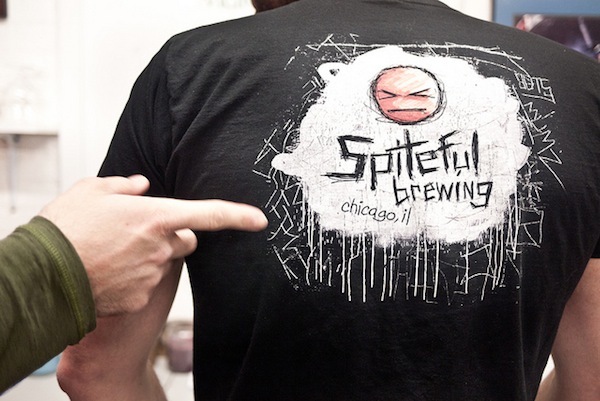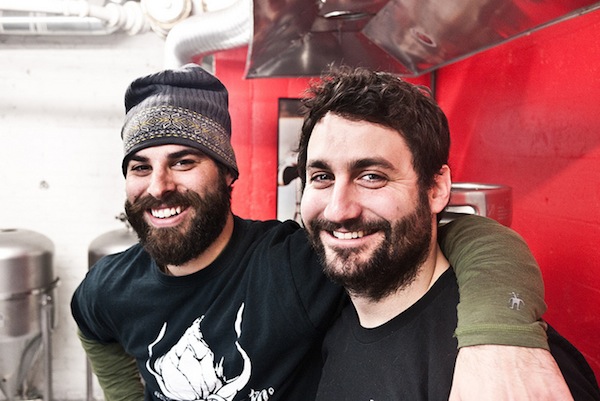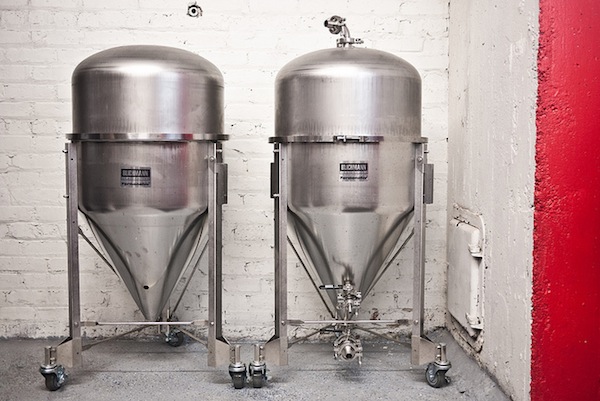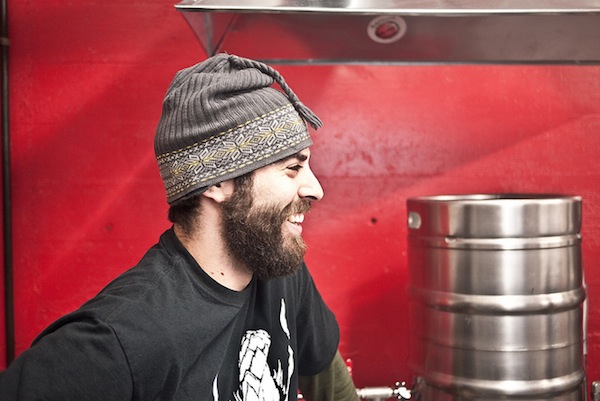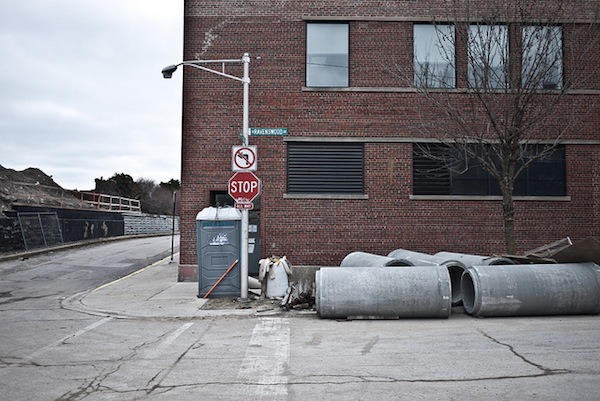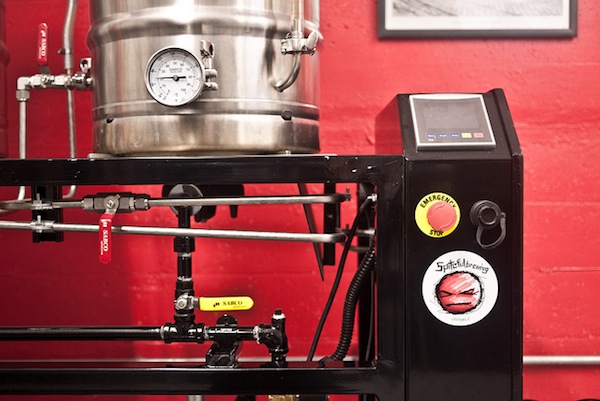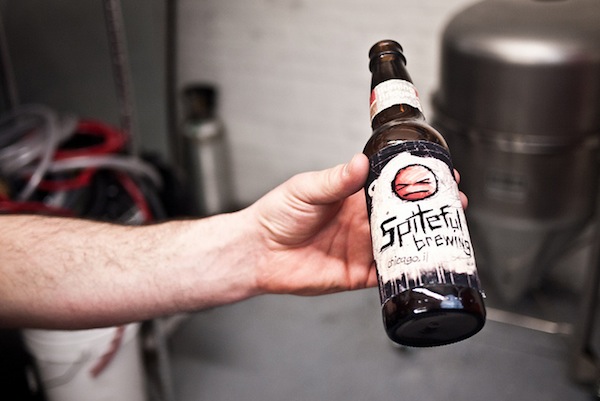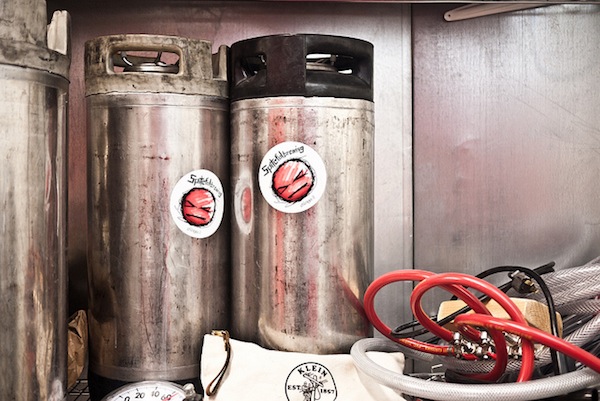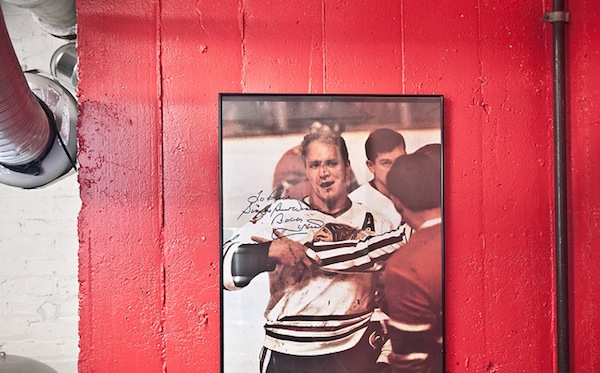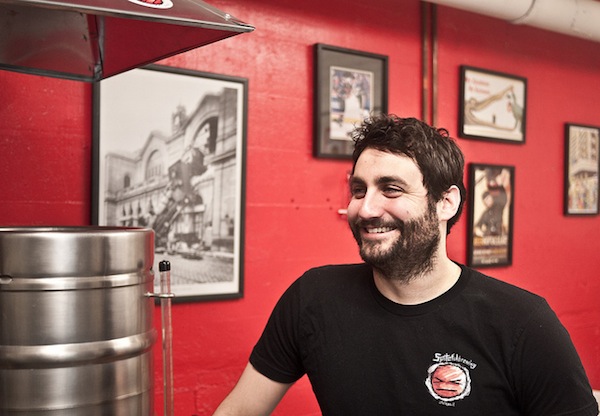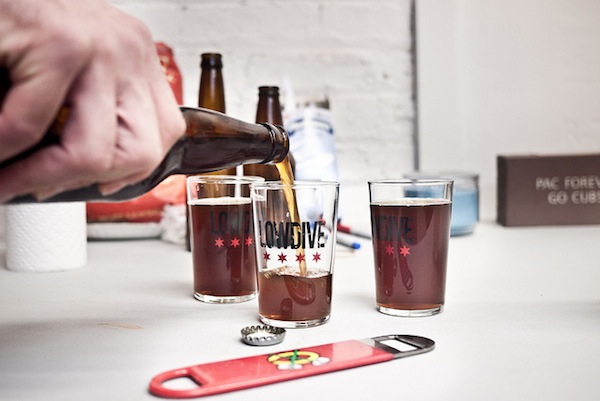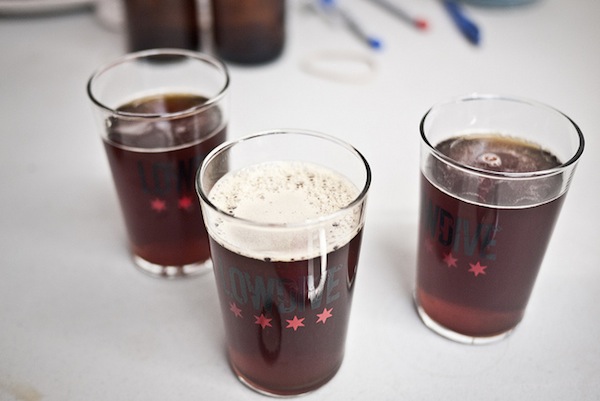Spiteful Brewing: Chicago's Smallest Start-Up Brewery
By Paul Schneider in Food on Mar 13, 2012 4:00PM
Of all the breweries-in-planning in Chicago, Spiteful Brewing is as small as they get. We sat down with the founders to find out how they reconcile their pint-sized start-up plans with their barrels of ambition.
Brad Shaffer and Jason Klein first crossed paths by chance when they found themselves, nine and ten, getting cross-checked by grown men during a heated game of pond hockey in their hometown of Buffalo Grove.
Shaffer recalled, "I was pissed off. I didn't know who Jason was, but I said something to him and he was pissed off. Right then and there it was like, 'We fucking hate these guys, so let's go beat them.'" They did. Their childhood friendship forged in spite set the wheels in motion for what will soon be Chicago's newest and smallest production brewery.
Shaffer and Klein's hockey friendship strengthened in high school when they played for the same team for three years before they ditched the ice for the warm sun of Arizona during college. After a year there together, Brad transferred to Colorado, where his craft beer obsession took root. It hasn't let go.
"This all started about two and a half years ago," explained Shaffer. "I moved back from Colorado and I was unemployed. Jason was unhappy working for the family business."
Klein completed his thought, as they often do for each other. "We wanted to do something we loved. We wanted to wake up happy to go to work everyday."
They kicked around the idea of opening a bar, but found the odds too long in what they concluded was the most competitive city in the country for bars.
One day, in November of 2009, Klein spit it out: "Why don't we do a microbrewery?"
Now they're waiting on a federal license to start brewing in a just-big-enough space at Berteau and Ravenswood, where they will brew two or three year-round selections along with seasonals. Their system is a thirteeen-gallon capacity pilot system, similar to what Sam Calagione used back in 1995 to start Dogfish Head, which is now pumping out 120,000 barrels per year and is poised for a major expansion that could increase capacity to half a million barrels. Will Spiteful ever be that big? Who knows. For Shaffer, 28, and Klein, 29, the path is more important than the destination.
Chicagoist: Did your time apart lead to where you are now? Did you both come back from school big beer geeks?
Jason Klein: In Arizona, I drank Keystone Light, the Beast, Natty Light. They all kind of made me sick. But now when I think back to that, it's sad actually. I wasted a lot of prime beer drinking.
Brad Shaffer: When I moved here from Colorado, I was scouting good craft beers when I was hanging out with these guys and they thought I was an asshole.
JK: We couldn't take this guy anywhere, he was always like 'Oh, I need to have a proper beer.' But he eventually made it click for me. He went to Colorado and loaded up his truck and we drank the best shit ever.
BS: A bunch of stuff from Washington and Oregon that you can't get out here.
JK: Once that happened, I was done. I haven't touched a Miller Lite since. Thank god.
C: So you were both back here, Brad unemployed and Jason unhappy. You scrapped the bar idea and Jason suggested a brewery. What happened from that point?
BS: It was like fireworks went off. I was like, 'Why the fuck didn't I think of that? I just came back from Colorado, there was beer everywhere.'
We started on the stove. We went and bought the starter kit and jumped into it. The idea was to progress as we go, to keep learning as we do it. The first five extract brews weren't that good. We were still learning.
JK: There are some pictures of me carrying three bags of ice half a mile in fucking January. My buddy though it was so funny he just took pictures of me. I was miserable. But we always knew when we started brewing that we wanted to open a brewery some day, so there was a goal in mind. We pursued it kind of like a job.
BS: I would say we were aggressively homebrewing. Any weekend we had free we were brewing.
JK: We were doing it to take that learning curve and shorten it, knowing that most people who open a brewery have been brewing at home for years.
C: Many of your peers are planning on entering the market with the capacity to produce thousands or tens of thousands of barrels (31 gallons each) of beer per year. And you're planning to make...
JK: Twenty five. Brewing is unique in that it allows you to scale your brewery down to our size and still be a legitimate business. You can't do that with a bar. You can't do that with any other number of businesses, it just doesn't work. My background is manufacturing. There are no nano manufacturing places. There's too much overhead, too much capital. With brewing, it provides us the opportunity to get licensed, break into the market, and learn and grow at our own pace, which is important to us because we are new at this. It's almost like a pilot system and a pilot business. We don't plan to be a pilot business forever, but we need to get into the industry.
BS: The way we're doing it is allowing us to exist. If we bought a big place, we wouldn't be able do it our way. The next thing is bigger equipment, a bigger place, and our place on Berteau is a stepping stone that will allow us to get there. Doing it this way means our fermenters will be full all the time. As soon as they're empty, we're going to brew our asses off. And we're just going to keep doing it. We're so small that we have to. We have no problem doing that.
JK: There's nothing wrong with a bigger entry strategy. You can certainly do that and that's great for some people. And you can contract brew and break into the market that way. Those are proven approaches. That's just not us. We want to put our time in. We want to learn. I don't want to hire a head brewer and not understand the process, because it's our company.
We want to bring great beer to a great city one bar at a time. That's our plan and that's why we're starting small. We're only going to be able to handle a few bars, two to five max in the city. We want people to have access to the beer and this gives people access to our beer while we're planning for the future. The first stepping stone is a bigger production brewery, ten barrels or more, and the ultimate goal after that is a brewpub.
BS: We're not going to let time get in the way of our goals. We’re going to slowly get there on our own terms. If we're on Berteau for two years, so be it. We're learning as we go.
JK: As we're learning through our licensing process, there are a lot of time issues we don't have control over. That's not going to be any different when we expand.
BS: We want to show up everyday. We want to be the ones making the decisions and brewing the beer. If we can quit our day jobs and do that, great.
JK: It will mean more to us when we put our sweat equity into it.
C: How do you divide your roles and break up all the work that goes into starting a brewery?
JK: We've defined it more lately. It's evolved. When we first started we were doing everything together as much as possible. We came up with the recipe and brewed it together. Everything was fifty-fifty. What we've learned and what we're still evolving with is that's not a sustainable model. It's not efficient.
BS: I've been doing more the brewery side of things. He's more the business side. I'm the one cleaning kegs.
JK: That's the way it's worked out, and that's the way it makes most sense. I grew up in a family business and have more experience on the business side of things. He's better at the day-to-day brewery stuff than I am. He sees things differently, like a puzzle and he's fast, he doesn't waste time, he's got a process, and he refines it. I come in here and I'm like, 'Can I help you?' and all I do is fuck his world up. On the other hand, if you really want to get annoyed, watch him type an email. He's a hunt-and-pecker.
BS: Exactly. So I stay the fuck away from it. He'll come in and clean kegs, and I'll be like, 'What are you doing man?' So it's one of those things where we complement each other and we've finally taken roles.
C: You guys have known each other for a long time. Does that make it easier or harder to work together?
BS: Part of the beauty of us knowing each other for so long is that we're able to tell each other, 'Go fuck yourself.'
JK: We're not worried about hurting each other's feelings.
BS: It comes down to what we've always said about Spiteful. You have to do what's good for the company.
JK: In our very first notebook that we bought, it's written at the top of several pages.
BS: Number one: Don't be an idiot. Number two: Is this good for the company?
JK: Those are the two things we use to approach almost everything we do. That's what keeps us on point when we're making decisions when the other person is not there.
C: Where do you think Chicago's craft beer scene will be in five or ten years?
BS: I would say it starts on the west coast, goes to the east coast, and finally funnels back into the Midwest. We're finally starting to see that. The craft beer industry has been huge for a decade out west. You didn't drink crappy beer in Colorado, where I lived. It's finally starting to funnel into Chicago and get bigger.
JK: I think Chicago is going to be a powerhouse city in the craft beer industry. How could it not? There are a lot of breweries in planning and a lot of people doing it their own way, which is awesome. I think in five years you're going to see a lot more Chicago breweries of all shapes and sizes. I think there will be more nanos, more community breweries like Argyle, more of everything. I think it's going to be great for the Chicago beer drinker and it's only going to get better. If Portland can support that number of breweries--I think their market share is 30% craft--that's amazing and that only gives us hope and a bright future. We've got the well-established players here who are doing great and they've been a great example and will continue to grow. I think a lot of big guys will pop up and a lot of little guys will pop up. I don't think we're going to be a saturated market in five years. I don't think there's any chance.
Interested in trying brews from Chicago's up-and-coming brewers? Check out the Brew Springsteen event on April 7. We had a great experience at the Brew Ho Ho, by the same organizers, back in January.
Photos by Michael Kiser, Good Beer Hunting
